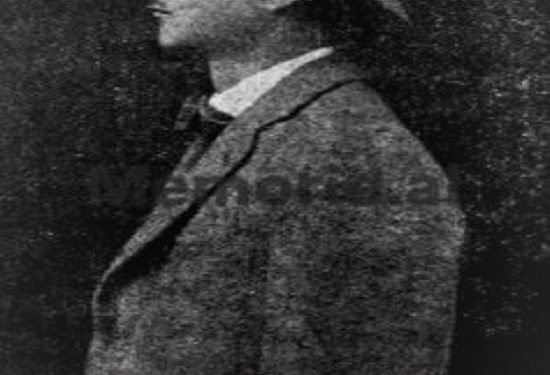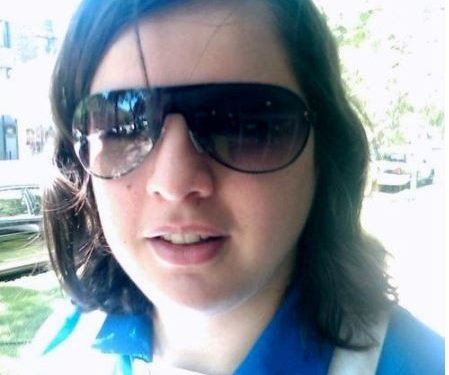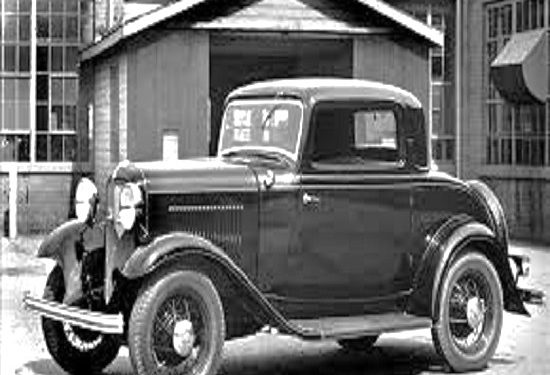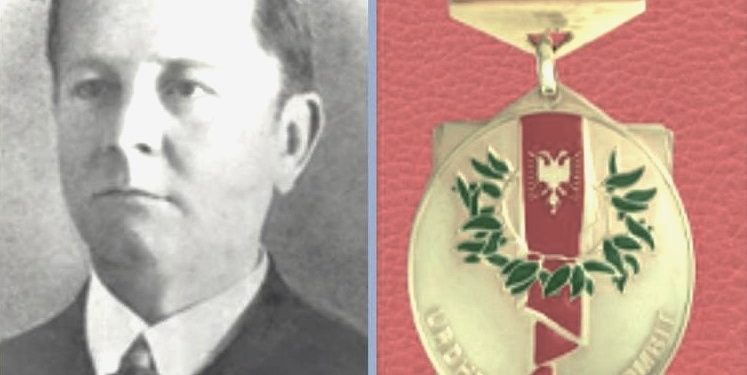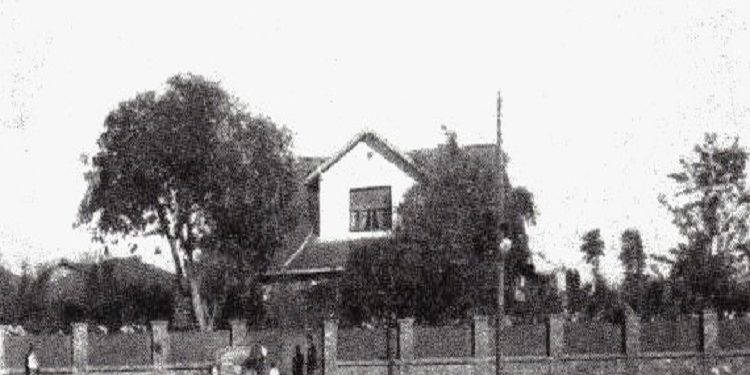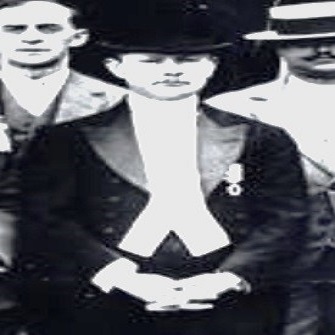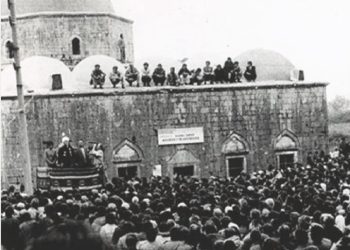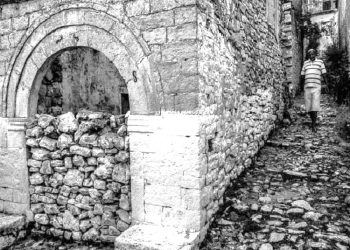From Marsida T. Najdeni
Memorie.al / I was very pleased when on April 28, 2016, the forgotten figure of Rexhep Jella was given some honor after a persecution lasting half a century. Former President of Albania Bujar Nishani awarded the “Honor of the Nation” medal (posthumously) number 9537 to intellectual Rexhep Jella, with the motivation: “For the distinguished activity of a truly Western intellectual and the undeniable and valuable patriotic contribution to the service of our country and nation, given also during important global historical conferences where the future of Albania was determined.”
Undoubtedly for me, this personality is one of the most beloved figures not only of Tirana but of all Albania. Along with Lef Nosi and Xhemal Farka, I believe they should be placed on the pedestal of distinguished statesmen of Albania, who during their lives demonstrated citizenship, emancipation, and integrity.
The Family from Which Rexhep Jella Descended
The Jella family has its roots in the city of Tirana, now spanning over 12 generations. Among the long list of indigenous Tirana families, this esteemed family is included. A family that was dedicated to education and not commerce, a choice made by the Jella family generation after generation. They were not wealthy but were not considered poor either. From the memories of Rexhep Jella’s daughter, Hatixhe, it is known that they lived off the income from some properties inherited from their ancestors.
With Rexhep’s education and employment, along with the management of these properties by his brother Ramazan, the family would experience a cultural and intellectual development, akin to a European family. The Jella family, like many noble and aristocratic families of the capital, never had the vice of appearing above others, but they were characterized by simplicity and harmony with their neighbors and fellow citizens.
Who Was Rexhep Jella?
Rexhep Jella was born in Tirana in 1895 and completed his primary education in his hometown, while his secondary education was in Istanbul. In the city of Istanbul, Rexhep would demonstrate exceptional intelligence, graduating among the top students of the high school with high marks. This achievement enabled him to win a college scholarship at one of the world’s most prestigious universities. Thus, in 1914, Rexhep began higher studies at the University of Cambridge in England, where he graduated in Political Science from the Faculty of Law.
From this world-renowned university, he gained not only first-class education but also an Anglo-Saxon culture. Additionally, he became a member of many sports and legal clubs. These memberships expanded his social circle to include intellectuals from all over the world—friendships that he would maintain for years, utilizing them for the benefit of his nation.
Like many intellectuals of the time, he returned to his homeland to engage in the governance of the country. His extensive knowledge of legislation and command of several foreign languages, such as English, Turkish, Italian, Persian, French, etc., made him a key figure in Albanian politics, both domestically and abroad.
Thus, in 1918, he participated in the Peace Conference in Paris. In 1920, he was a participant in the Congress of Lushnja. He served two terms as a deputy in the Albanian Parliament in 1923 and 1937. From 1926 onwards, he would be the prefect of Gjirokastër, Elbasan, Durrës, Berat, and sub-prefect of Korçë.
Later, he would also serve as the prefect of Tirana, a period during which Tirana, as the capital, experienced progressive development compared to the rest of Albania. As mayor (1930-1933), he oversaw many urban development projects and was actively involved in the construction of the American Technical School (known as Harry Fultz School) and the construction of the new city hospital, where he also delivered the inauguration speeches.
This hospital, at the time, was said to be the largest in the Balkans. Another speech by Rexhep Jella was for the inauguration of the American Embassy building. In 1937, he was awarded by King Zog the distinguished medal “The Skanderbeg Order,” as well as in 1938, the title “Prefect of the First Class.”
As an Anglo-Saxon student, Rexhep played football in the college leagues of England. Thus, his connections with the world of organized football date back to his student years. Football had been played in Albania for some time, but there was no proper organization or federation. Few people know that Rexhep Jella was one of the initiators of the establishment of the Albanian Football Federation.
The Commission of the Albanian Championship consisted of: 1. Rexhep Jella, 2. Mihal Sherko, 3. Ali Erebara, 4. Orresto Morra, 5. Giandomenico De Marchis, who made up the leadership, thereby making Rexhep Jella de facto the first President of the Albanian Federation. There is no doubt about this, as in every document of the Albanian Federation of that time, Rexhep Jella signed as the President of the Commission. No one contested this, except for the ever-present researcher and famous journalist, Besnik Dizdari.
“Sporting events, in addition to promoting sport in general, should serve to unite spirits and eliminate the harmful tendencies of antagonism that, if introduced into the sporting arena, would perpetuate anger and resentment between different regions and circles, which, on the contrary, should be eradicated.” This was written with foresight by Rexhep Jella, as President of the Albanian Football Federation.
The Englishman who came to Albania for the translation of the football regulations, Colonel Dayrell Oakley Hill, who also brought his two sons as referees, described his friend Rexhep Jella like this: “Rexhep Jella was a grounded and agile man, with chestnut hair and a warm demeanor; he knew everyone, spoke very good English, Turkish, Italian, and French; he also knew Persian and enjoyed reading ancient poets. He drove an original ‘Ford V8’ car.”
In these circumstances, we cannot forget Rexhep Jella’s involvement in the organization of Albanian Athletics, a championship that began on September 2, 1929. The Organizing Committee of the Albanian Athletics Championship, as it was called, consisted of: 1. Rexhep Jella, 2. Rasim Kalakula, 3. Colonel Bellocchio, 4. Hasan Lame, 5. Giandomenico De Marchis, 6. Kol Zadrima, 7. S. Pejani, 8. Harry Fultz. To emphasize the importance of Jella’s figure in sports engagements, I note that the speech on the inauguration day of this championship, which preceded many other sports championships, would be delivered by Rexhep Jella.
Persecutions by the communist regime against Rexhep Jella!
With the arrival of the communists to power at the end of 1944, the life of Rexhep Jella would also take a downturn. He was accused of being “an agent of the English and a high-ranking official of the Kingdom.” He was arrested on February 9, 1945, and on November 1 of the same year, by decision no. 161, the Military Court declared him guilty of having “had connections with the Secretary General of the Ministry of Economy, Roco, with whose mediation he traded in grams, selling them in Corfu. He had connections with the war criminals of the Albanian people, Irfan Ohri and Abaz Kupi, and he had a gendarme as a guard,” sentencing him to 2 years in prison.
On July 20, 1947, he was arrested again, and on December 25 of that same year, by decision no. 722, the Military Court of Tirana declared him guilty of “agitation and propaganda against the people’s power; he participated in the treasonous organization of deputies,” and sentenced him to 5 years in prison, confiscation of property, and loss of rights equivalent to the term of the sentence. In addition to the loss of his property, a large number of documents and books would be stolen from him. His brother, Ramazan, would be killed under torture in the State Security cells, in the Durrës prison.
On January 4, 1994, the commission established to identify those who disappeared during the time of serving sentences with deprivation of liberty (who died in cells without being tried and those executed without trial) decided to acknowledge the extrajudicial killing of Ramazan Jella on May 18, 1947, in the isolation rooms in Durrës. They also imprisoned his son, Jusuf. Jusuf was born in 1922 in Tirana.
He was arrested on May 26, 1945, and on June 27 of that year, by decision no. 3, the Special Judicial Council of Command I sentenced him as “the organizer of desertion groups” and “as an inciter of desertion,” sentencing him to death. On July 4, 1945, by decision no. 168, the High Court commuted his sentence to life imprisonment. By decree of the Presidium of the People’s Assembly no. 819, dated April 27, 1949, the sentence was reduced to 14 years of deprivation of liberty.
It is obvious how crushed Rexhep emerged from prison. They would not be satisfied with just that, but would send him to work a menial job in a remote village in Kavajë. There, he had no right to a pension or even a bread ration. In what miserable conditions had this intellectual giant been reduced, who had done nothing but serve his homeland?
In the last seven years of his life, he was unable to see his beloved Tirana again, as class warfare was ever-present, and for every movement he made, he had to declare it at the Department of Internal Affairs. Thus, to avoid further inconveniencing his friends, he decided not to come to Tirana again. He died in 1974 in complete poverty and forgotten by all./Memorie.al




